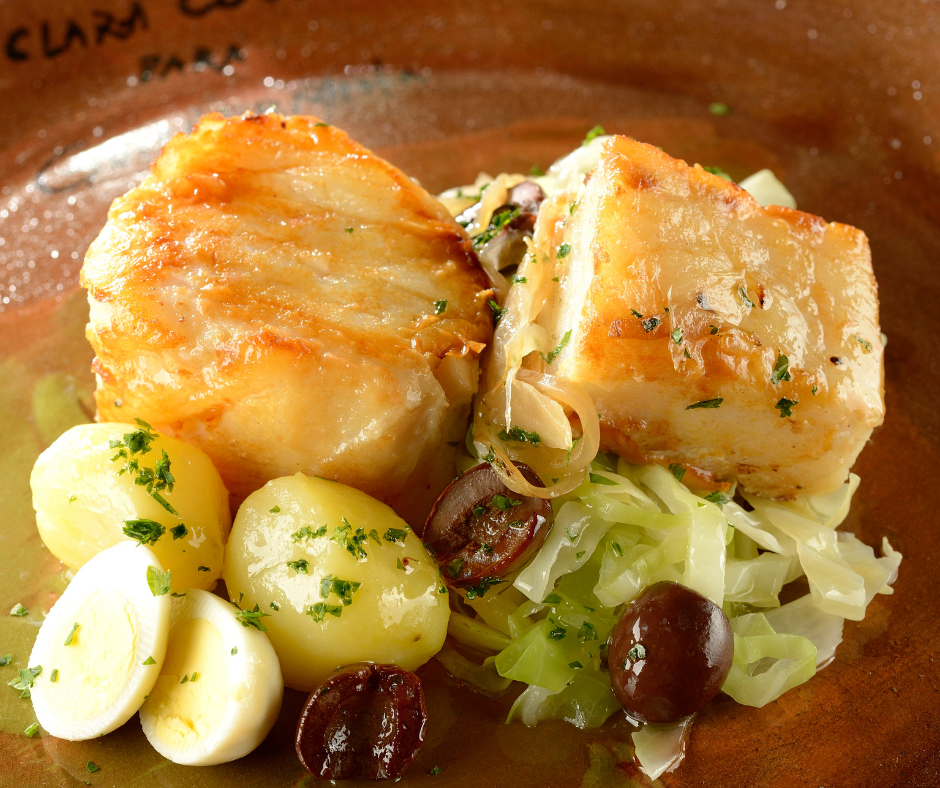Introduction
Cod is a popular and widely harvested fish known for its flaky white flesh and mild flavor. This fish species belongs to the Gadus genus and includes over a dozen other varieties. Atlantic and Pacific cod are the two most prevalent types of cod that we consume in seafood restaurants. This blog will help you explore ‘Is Cod Fish Healthy?‘.
What Is Cod Fish And Its Nutritional Value?
Cod is a highly nutritious fish rich in essential vitamins and minerals for proper bodily function. It is a great source of protein and low in fat, making it an excellent food option for people who want to maintain a healthy body weight. Cod is a good source of phosphorus, potassium, niacin, selenium, omega-3 fatty acids, choline, and iodine.
These nutrients offer various health benefits, including improving heart health, regulating blood pressure, reducing the risk of cardiovascular diseases, promoting brain health, weight management, maintaining healthy cholesterol levels, and improving bone and dental health. Eating cod regularly can improve overall health and promote a balanced diet.
The Importance Of Incorporating Fish In A Healthy Diet
Fish, including cod, is an essential component of a healthy diet. They are a rich source of high-quality protein and omega-3 fatty acids important for brain function and optimal health. Studies have shown that consuming fish regularly can help reduce the risk of heart disease, stroke, type 2 diabetes, and other chronic diseases.
Incorporating fish into your diet can also help you maintain a healthy weight and reduce the risk of obesity. Fish is low in calories and high in protein, which helps regulate appetite and prevents overeating. Additionally, eating fish instead of red meat can lower the risk of heart disease and several types of cancer.
In summary, consuming cod fish has numerous health benefits. It is a highly nutritious seafood that is low in fat and essential vitamins and minerals. Including cod fish in your regular diet can improve overall health, promote weight management, reduce the risk of chronic diseases, and support a balanced diet.
Is Cod Fish Healthy: Health Benefits Of Cod Fish
Codfish is a popular seafood known for its mild and flaky white flesh. It belongs to the Gadus genus and comprises over a dozen other types. Atlantic and Pacific cod are the most commonly consumed varieties of this fish at seafood restaurants. But Is Cod Fish Healthy?
Cod Fish And Cardiovascular Health
Cod fish is a rich source of heart-healthy omega-3 fatty acids. It contains eicosapentaenoic acid (EPA) and docosahexaenoic acid (DHA), the two primary types of omega-3 fats that are essential for overall health. Consuming cod regularly is linked to cardiovascular benefits such as decreased blood pressure and triglyceride levels. Pacific and Atlantic cod have the most omega-3 fatty acids per serving, making them an even healthier choice.
Cod Fish And Inflammation Reduction
Codfish consumption may also reduce inflammation in the body. Inflammation is an immune response from exposure to harmful stimuli or pathogens. Chronic inflammation is linked to several health issues, such as cancer, autoimmune diseases, and heart disease. Eating cod regularly can help reduce inflammation due to its high omega-3 fatty acids and the amino acid taurine content.
Incorporating cod fish into a healthy diet can provide numerous health benefits. It is a low-fat source of protein packed with essential vitamins and minerals needed for proper bodily function. Consuming cod regularly can promote heart health, regulate blood pressure, reduce inflammation, maintain healthy cholesterol levels, promote brain health, support weight management, and improve bone and dental health. With all these potential benefits, adding codfish to a regular diet can improve overall health and promote a balanced intake of nutrients.
Omega-3 Fatty Acids In Cod Fish
Cod fish is a type of seafood prized for its mild flavor and white, flaky flesh. The fish belongs to the Gadus genus and is available in many varieties, with Pacific and Atlantic cod being the most commonly consumed. In addition to being a tasty food choice, cod fish is also packed with various nutrients essential for good health.
The Role Of Omega-3 In The Body
One of the key nutrients found in cod fish is omega-3 fatty acids. These fats are essential for a healthy body and are linked to various health benefits. Omega-3s are known for their anti-inflammatory properties, which can help reduce the risk of chronic diseases such as arthritis, heart disease, and cancer. They are also crucial for brain health, particularly during fetal development and early childhood.
Lowering Triglycerides With Omega-3
In addition to their anti-inflammatory properties, omega-3 fatty acids found in codfish also help lower triglycerides in the blood. Triglycerides are a type of fat present in the bloodstream that can contribute to the development of heart disease. Consuming foods rich in omega-3s, such as codfish, can help lower triglycerides and improve overall cardiovascular health.
Overall, cod fish can be a healthy addition to any diet. Its high omega-3 content and other essential vitamins and minerals can provide numerous health benefits. Incorporating cod into a balanced diet can help regulate blood pressure, reduce inflammation, maintain healthy cholesterol levels, promote brain health, support weight management, and improve bone and dental health. With all these potential benefits, adding codfish to a regular diet can improve overall health and contribute to a well-rounded and nutritious diet.
Varieties Of Cod Fish And Their Differences
Cod fish is a popular type of seafood available in different varieties, with Atlantic and Pacific cod being the most widely consumed. Apart from these, black cod, also known as sablefish, is another type of cod gaining popularity due to its high nutritional value. Here are some differences between these varieties.
Atlantic Cod Vs. Pacific Cod
One of the main differences between Atlantic and Pacific cod is their habitat. Atlantic cod typically lives in the colder waters of the North Atlantic, while Pacific cod can be found in both Eastern and Western regions of the North Pacific. When it comes to taste, Atlantic cod has a milder flavor and softer texture compared to the firmer, slightly sweeter flesh of Pacific cod.
Black Cod Vs. Atlantic Cod
Black cod, also referred to as sablefish, is a type of cod that is more caloric than Atlantic cod. It is rich in omega-3s, iron, zinc, and calcium, making it a highly nutritious food choice. Black cod has a distinct buttery and mild flavor profile with a delicate texture. On the other hand, Atlantic cod has a mild flavor and white, flaky flesh, making it a versatile ingredient in many dishes.
In conclusion, cod fish is packed with essential nutrients contribute to overall health and well-being. While different varieties might have slight differences in taste and texture, they all offer various health benefits. Incorporating cod into a balanced diet can support weight management, improve cardiovascular health, promote brain health, and maintain healthy cholesterol levels. Consumers can choose from different varieties of cod, depending on their preference and availability.
Sustainable Harvesting Of Cod Fish
Cod fish has been a valuable fish for centuries and a major source of income for communities worldwide. However, the overfishing of cod has posed a serious threat to the species’ survival. As a result, sustainable harvesting techniques and eco-friendly alternatives have become a high priority in the fishing industry.
The Story Of Overfishing
For centuries, the cod fishery has been a major industry, providing food and livelihoods for millions of people. However, overfishing and poor management practices have led to a severe decline in cod populations. The effects of overfishing are felt not only by fish and wildlife but also by the fishing communities that depend on this industry.
Eco-friendly Alternatives
Sustainable fishing practices are vital to cod populations’ continued survival and health. Numerous eco-friendly alternatives can be implemented to reduce the industry’s environmental impact. These include:
- Reducing bycatch: Bycatch is the unintended capture of non-target species often discarded or sold at a lower price. Reducing bycatch can help to maintain fish populations and minimize the impact on the ocean ecosystem.
- Regulating fishing practices: Regulations can be implemented to limit the fish caught per day or restrict the fishing season to allow populations to recover.
- Investing in sustainable aquaculture: Aquaculture is farming fish in tanks or ponds rather than harvesting them from the wild. Sustainable aquaculture practices can provide a reliable source of fish while reducing the impact on natural populations.
In conclusion, sustainable harvesting practices are crucial for the preservation of cod populations and the health of our oceans. By implementing eco-friendly alternatives in the fishing industry, we can ensure that future generations can access this nutritious and delicious fish.
Nutritional Value Of Cod Fish
Cod fish is a popular seafood known for its mild taste, flaky white flesh, and significant nutritional value. This fish is a rich source of essential nutrients, including omega-3 and omega-6 fatty acids, vitamins B12, B6, E, A, and C, and minerals such as phosphorus, potassium, and selenium.
Calories And Macro-nutrients Per Serving
A 3-ounce serving of cooked cod fish contains approximately 89 calories, 19 grams of protein, 0.4 grams of fat, and 0 grams of carbohydrates. This makes cod an excellent option for individuals looking for a low-fat, high-protein diet.
Vitamins And Minerals In Cod Fish
Cod is an excellent source of vitamin B12, with a single serving providing more than the daily recommended intake. Vitamin B12 is essential for properly functioning the nervous system and producing red blood cells. Cod is also rich in vitamin B6, critical in maintaining healthy brain function. Additionally, cod is a good source of vitamin E, a potent antioxidant that protects cells from oxidative damage.
Regarding minerals, cod is high in phosphorus, which is crucial in maintaining bone health and cell function. It also contains potassium, an essential electrolyte that helps balance fluids in the body. Selenium, another trace mineral found in codfish, is essential for immune system function and thyroid health.
In conclusion, cod fish is a nutrient-dense food that significantly benefits overall health and well-being. It is a great alternative to meat, providing healthy and sustainable protein sources. When harvested sustainably, cod fishing can maintain fish populations and minimize the impact on the ocean ecosystem.
Best Cooking Methods For Cod Fish
Cod fish is a popular seafood loved for its mild taste, flaky white flesh, and significant nutritional value. There are various ways to prepare and cook cod fish to enjoy its unique taste and health benefits. The best cooking methods for cod fish include baking, grilling, poaching, and pan-frying.
Baked Cod Recipes
Baked cod is an easy and healthy way to prepare this delicious fish. To make baked cod, thaw the frozen fillets at room temperature before patting them dry. Season the fillets with lemon, olive oil, salt, and cayenne pepper, then bake in the oven for about 15-20 minutes until cooked through. Baking cod seals in moisture and flavor, making it a simple yet delicious meal.
Grilled Cod Recipes
Grilled cod is another tasty way to enjoy this versatile fish. You can grill cod in foil or directly on the grill grates. Grilling on foil is easier, as the fish won’t stick to the grill or fall through the grates. To grill cod in foil, wrap the seasoned fillets and grill for 8-10 minutes. Grilling directly on the grill grates requires more attention, but it results in a smoky flavor and crispy texture. To grill cod directly on the grill, lightly oil the surface, then grill for 3-4 minutes per side until cooked.
In summary, the best cooking methods for cod fish are baking and grilling. These cooking methods preserve the fish’s unique taste and nutritional value while offering various seasoning options. Cod is a healthy seafood choice that provides essential nutrients and health benefits. It’s low in fat and protein and loaded with vitamins B12, B3 (Niacin), and B6, promoting heart wellness and brain functions. Cod is also low in mercury, making it a safe and sustainable choice for individuals looking for healthy protein alternatives.
Side Effects And Precautions
While cod fish offers numerous health benefits, it is essential to be cautious of potential side effects and precautions.
Mercury Concerns
Codfish contains low levels of mercury, making it safe for most people to eat without concern. However, pregnant women and young children should limit their consumption of certain fish due to mercury content. Consuming up to six ounces of cod per week during pregnancy is generally safe.
Allergies And Interactions
Individuals with fish allergies should avoid eating codfish, as it can cause an allergic reaction. Moreover, cod fish may interact with certain medications, such as blood thinners, and cause negative side effects. Individuals taking medication should consult a healthcare provider before adding cod fish to their diet.
Overall, cod fish is a healthy and delicious option for seafood lovers. By preparing cod using the suggested cooking methods and taking the necessary precautions, individuals can safely and easily enjoy its health benefits.
Conclusion
Now you should know the answer to ‘Is Cod Fish Healthy?’. Cod fish is a healthy and delicious option for seafood lovers. By preparing cod using the suggested cooking methods and taking the necessary precautions, individuals can safely and easily enjoy its health benefits. Cod fish is a low-fat, high-protein food with essential nutrients, vitamins, and minerals, promoting heart wellness and brain function. Cod fish is also low in mercury, making it a safe and sustainable choice for individuals looking for healthy protein alternatives.
Why Cod Fish Is A Healthy Addition To A Balanced Diet
Cod fish is a healthy addition to a balanced diet as it helps support heart health, boosts brain function, and provides essential nutrients, such as omega-3 and omega-6 fatty acids. It is also an excellent source of vitamins B12 and B6 niacin and vitamins E, A, and C. Cod fish is a versatile ingredient that can be enjoyed in various recipes, making it easy to add to a balanced diet.
The Versatility Of Cod Fish In Recipes
Cod fish is versatile in various recipes, from baked and grilled dishes to stews and chowders. It pairs well with various herbs and spices, such as lemon, garlic, and paprika. Additionally, cod fish is a low-calorie and low-fat food that can be incorporated into a healthy and balanced diet without sacrificing flavor or culinary creativity.
FAQ: Is Cod Fish Healthy: Unveiling the Health Benefits of Cod
Q: What are the health benefits of consuming codfish?
A: Cod fish is loaded with lean protein, vitamins, and minerals, making it a nutritious and flavorful food choice. Consumption of cod fish is associated with various health benefits, such as a lower risk of heart disease and support for a healthy weight.
Q: How does cod compare to fatty fish regarding omega-3 fatty acids?
A: Fatty fish like salmon have higher levels of omega-3 fatty acids than lean fish like cod. Although cod may have lower levels of omega-3 fatty acids, it is still a nutrient-dense food that contains many beneficial nutrients in relatively few calories.
Q: Is cod fish a good source of high-quality protein?
A: Yes, cod fish is a good source of high-quality protein. It is an excellent food option for people who want to maintain a healthy weight and build muscle.
Q: Is cod fish safe for consumption?
A: Yes, cod fish is safe for consumption, and it contains less mercury than some seafood, including popular fish like tuna. However, it is essential to choose fish from reputable suppliers and prepare it correctly to ensure safety.
Q: Can consumption of cod help with weight loss?
A: Lean fish like cod can promote good health and may be weight-loss-friendly. It is a low-calorie food option that is high in protein, making it a satisfying and healthy addition to a weight-loss diet.



